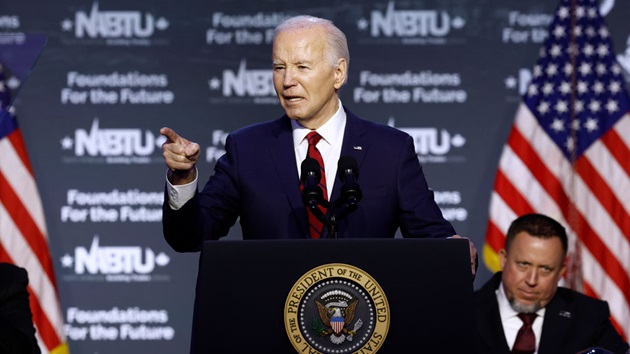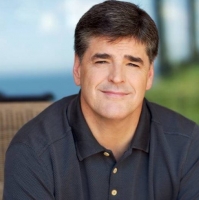
(WASHINGTON) -- As various Supreme Court justices themselves acknowledged during a high-stakes hearing on Thursday, they could potentially reshape the contours of presidential power when they rule on whether Donald Trump is entitled to some amount of immunity from prosecution for alleged acts in the White House as he pushed to overturn his 2020 election loss.
Over nearly three hours on Thursday, with demonstrators gathered outside, the justices grappled with arguments from both Trump's attorney and an attorney for special counsel Jack Smith, who has charged Trump in connection with his effort to stay in office after losing to now-President Joe Biden.
Trump denies all wrongdoing and disputes some of what he is accused of doing while he maintains that other actions were part of his presidential authority.
The oral arguments included several notable and important exchanges. Here are 10 of the key moments.
A decision is expected from the court by the end of June.
Could a president assassinate his rival?
Justices Sonia Sotomayor and then Samuel Alito touched on one of the most provocative hypotheticals raised in Trump's battle for "absolute immunity" from charges over what he claims were official acts: Could a commander in chief order SEAL Team 6 to assassinate a political rival and not face prosecution?
Sotomayor raised it first while questioning Trump attorney John Sauer. She pointed back to an earlier exchange Sauer had in a lower court proceeding.
"I'm going to give you a chance to say ...if you stay by it: The president decides that his rival is a corrupt person and he orders the military, or orders someone, to assassinate him -- is that within his official acts for which he can get immunity?" she asked.
"It would depend on the hypothetical," Sauer answered. "We could see that could well be an official act."
Sotomayor pressed on that point: "Immunity says even if you did it for personal gain, we won't hold you responsible -- what do you -- how could that be?"
Sauer pointed back to a U.S. Supreme Court ruling from the '80s that held a president is immune from civil liability related to this official acts, which Sauer said is a basis for their own argument now about criminal liability.
"That's an extremely strong doctrine in this court's case law in cases like Fitzgerald," he said.
Later, Alito referred back to a president's hypothetical use of the military as elite assassins as he and Sotomayor split on whether "plausibleness" was a useful standard for scrutiny versus "reasonable."
"One might argue that it isn't plausible to order SEAL Team 6 -- and I don't want to slander SEAL Team 6 because they're -- no, seriously -- they're honorable, they're honorable officers and they are bound by the uniform code of military justice not to obey unlawful orders -- [but] I think one could say it's not plausible ... that that action would be legal," Alito said.
To Sauer, he said, "I'm sure you've thought of lots of hypotheticals where a president could say, 'I'm using an official power,' and yet the power uses it in an absolutely outrageous manner."
'What was up with the pardon of President Nixon?'
Justice Ketanji Brown Jackson pressed Sauer on his contention that without immunity all future presidents would feel paralyzed to take official acts that could put them in criminal jeopardy.
"I mean, I understood that every president from the beginning of time essentially has understood that there was a threat of prosecution [upon leaving office]," Jackson said.
Sauer responded by quoting Ben Franklin from the constitutional convention, to which Jackson seemed skeptical.
"But since Benjamin Franklin everybody has presidents who have held the office [who knew] that they were taking this office subject to potential criminal prosecution, no?" she said.
She cited one well-known example of a former president who came under legal scrutiny.
8 years after the National Enquirer's deal with Donald Trump, the iconic tabloid is limping badly
"What was up with the pardon for President [Richard] Nixon? ... If everybody thought that presidents couldn't be prosecuted, then what -- what was that about?" she said.
"He was under investigation for both private and public conduct at the time -- official acts and private conduct," Sauer said, going on to indicate that there had long been established an understanding that presidents could be prosecuted for private acts.
"Counsel on that score, there does seem to be some common ground between you, your colleague on the other side, that no man's above the law and that the president can be prosecuted after he leaves office for his private conduct, is that right?" Justice Neil Gorsuch asked.
"We agree with that," Sauer answered.
"And then the question becomes, as we've been exploring here today, a little bit about how to segregate private from official conduct that may or may not enjoy some immunity," Gorsuch said.
That underscored what could emerge as a key part of the court's ultimate decision: how to separate out Trump's conduct that is protected by the presidency, under a ruling of some executive immunity, and what he is accused of doing outside the bounds of his presidential authority that can be prosecuted.
But Trump's attorney concedes some conduct was private
Not long after, Justice Amy Coney Barrett questioned Sauer precisely where some of the described conduct falls, between official and private -- protected or unprotected.
"You concede that private acts don't get immunity," she said.
"We do," Sauer said.
Barrett then specifically cited various alleged acts from Trump's push to overturn the 2020 election, as described by prosecutors.
Barrett, quoting from court filings, said, "I want to know if you agree or disagree about the characterization of these acts as private. Petitioner turned to a private attorney who was willing to spread knowingly false claims of election fraud to spearhead his challenges to the election results. Private?"
"We dispute the allegation, but that sounds private to me," Sauer said.
Barrett continued: "Petitioner conspired with another private attorney who caused the filing in court of a verification, signed by petitioner, that contained false allegations to support a challenge. Private?"
"Also sounds private," Sauer said.
"Three private actors, two attorneys, including those mentioned above, and a political consultant, helped to implement a plan to submit fraudulent slates of presidential electors to obstruct the certification proceeding and petitioner and a co-conspirator attorney directed that had effort." Barrett said.
"I believe that's private," Sauer replied.
"Those acts you would not dispute," Barrett said. "Those were private and you wouldn't raise a claim that they were official."
Sauer said back: "As characterized."
'That's like a one-legged stool, right?'
A notable response came shortly after from Chief Justice Roberts when Sauer pushed the justices to remand the case back down to the lower courts to piece through which allegations in the indictment amount to a protected "official act" under the presidency.
"The official stuff has to be expunged completely from the indictment before the case can go forward," Sauer argued.
"That's like a one-legged stool, right?" Roberts said. "I mean, giving somebody money isn't bribery unless you get something in exchange. If what you get in exchange is to become the ambassador to a particular country, that is official, the appointment, it's within the president's prerogatives. The unofficial part is -- 'I'm going to get a million dollars for it.'"
After this exchange, Justice Clarence Thomas raised unprompted whether Trump's legal team was challenging the legality of the appointment of special counsel Jack Smith, a questionable theory previously pushed by right-wing lawyers like former Attorney General Ed Meese.
Sauer said Trump's legal team was making that argument in his separate Florida federal case, in which he is accused of mishandling classified information while out of office, but they weren't doing so directly in this case, to which Thomas did not follow up.
Justice Alito then asked Sauer if all official acts alleged in the Jan. 6 indictment should be excluded from trial, to which Sauer answered they should.
But Justice Sotomayor pressed back on the notion of remanding the case, arguing that even in the instances of acts that could be considered official, they came in the context of Trump pushing forward in his "private" intent of remaining in office.
"I don't think the indictment is charging that the obstruction occurred solely because of conversations with the Justice Department," she said. "They're saying -- you look at all of the private acts and you look in the context of some of the public acts and you can infer the intent, the private intent from them."
Fear of turning Oval Office into 'seat of criminal activity'
In questioning Sauer about why presidents shouldn’t face criminal liability for unlawful actions they take in office, Justice Jackson seemed to warn that, as she sees it, giving presidents absolute immunity could turn the White House into “the seat of criminal activity in this country.”
In response, Sauer insisted that while a president shouldn’t face criminal prosecution, they could face impeachment or other remedies for any unlawful conduct.
The exchange began when Jackson pressed, "If there’s no threat of criminal prosecution, what prevents the president from just doing whatever he wants?"
Sauer pointed to "impeachment, oversight by Congress, public oversight, there’s a long series."
"You seem to be worried about the president being chilled. I think that we would have a really significant opposite problem if the president wasn't chilled," Jackson said.
"If someone with those kinds of powers, the most powerful person in the world, with the greatest amount of authority, could go into office knowing that there would be no potential penalty for committing crimes -- I'm trying to understand what the disincentive is from turning the Oval Office into the seat of criminal activity in this country," Jackson continued.
She asked Sauer, "If the potential for criminal liability is taken off the table, wouldn't there be a significant risk that future presidents would be emboldened to commit crimes with abandon while they're in office?"
But Sauer indicated that such problems hadn't occurred so far.
"I respectfully disagree with that because the regime you described is the regime we operated under for 234 years," he said.
Can a president pardon themselves?
During Sauer's questioning, Gorsuch asked him to explain the Trump team's position on whether a president hypothetically has the power to pardon themselves, which he said could happen if presidents feared that their successors could prosecute them for actions they took while in office.
"I didn't think of that until your honor asked it. That is certainly incentive that might be created," Sauer answered.
"We've never answered whether a president can do that. Happily it's never been presented to us," Gorsuch said in response.
Later in the hearing, Michael Dreeben, arguing for the government, was asked for his view on whether the president has such authority.
"I don't believe the department of justice has taken a position," Dreeben said. The only authority that I'm aware of is a member of the Office of Legal Counsel wrote on a memorandum that there is no self-pardon authority. As far as I know, the department has not addressed it further and the court had not addressed it either."
Will the case be remanded -- delaying it until next year?
Roberts began his line of questioning of Dreeben, in the second half of the haring, by raising concerns about the opinion issued by the D.C. Circuit Court of Appeals in their sweeping rejection of Trump's claims of immunity.
Roberts said the statement that "a former president can be prosecuted for his official acts because the fact of the prosecution means that the former president has allegedly acted in defiance of the laws" concerned him because "as I read it, it says a former president can be prosecuted because he's being prosecuted."
Roberts said such a position could put too much faith in the justice system to act non-politically and out of good faith -- and he asked whether the Supreme Court should send the opinion back down to make clear to the circuit court that that is not the law.
Dreeben responded there are "layered safeguards" that protect against malicious prosecution.
"We are not endorsing a regime that we think would expose former presidents to criminal prosecution in bad faith, for political animus, without adequate evidence, or politically driven prosecution that would violate the Constitution," Dreeben said.
Near the end of the hearing, Barrett also noted that the justices could send the case back to the lower court to decide which of the actions in the indictment against Trump was official -- and therefore not prosecutable -- versus which were done in his private capacity.
Such an outcome could rule out a trial before the end of the year and before the November election.
Dreeben emphasized that the Department of Justice would prefer to tell a jury all of it: "There's an integrated conspiracy here that had different components, as alleged in the indictment. Working with private lawyers to achieve the goals of the fraud and ... the petitioner reaching for his official powers to try to make the conspiracies more likely to succeed.
"We would like to present that as an integrated picture to the jury so that it sees ... [the] gravity of the conduct."
However, Dreeben indicated that even if some of the alleged actions in indictment were deemed official in nature and not subject to prosecution, prosecutors would still want to present some of those actions to the jury to show Trump's state of mind when he engaged in actions deemed private.
Presidents can make mistakes without charges
Dreeben faced questions from Alito on whether or not presidents can make a "mistake" given the many competing pressures they are under in their day to day duties.
"Presidents have to make a lot of tough decisions about enforcing the law and they have to make decisions about questions that are unsettled," Alito said, then asking if a "mistake" makes a commander in chief criminally liable.
"Making a mistake is not what lands you in a criminal prosecution," Dreeben said.
Later he raised some of the specific accusations in the charges against Trump: "It is difficult for me to understand how there could be a serious constitutional question about saying, 'You can't use fraud to defeat the [certification of the winner of the presidential election], you can't obstruct it through deception, you can't deprive millions of voters of their right to have their vote counted for the candidate who they chose.'"
Charging FDR for internment camps?
Much of the justices' questioning of the attorneys on Thursday turned on hypotheticals to probe at the limits of each of their arguments about whether presidents should or should not be immune from prosecution.
Beyond Sotomayor asking about a potential assassination using the military, Justice Elana Kagan asked how immunity would apply if a president ordered soldiers "to stage a coup."
Sauer said in that potential case, it "may well be an official act" that would require impeachment and conviction before he is prosecuted.
He said something similar when Sotomayor asked if Trump's backing of "fraudulent" alternate electors in 2020, to try and overturn the results, as described in the indictment, was also part of his official duties. "Absolutely, your honor," Sauer said.
Alito added his own what-if as he questioned Dreeben, with the government.
"Mr. Sauer and others have identified events in the past where presidents have engaged in conduct that might have been charged as a federal crime, and you say, 'Well, no, that's not really true.' ... So, what about president Franklin D. Roosevelt's decision to inter Japanese Americans during World War II. Couldn't that have been charged under conspiracy against civil rights?" Alito asked.
Dreeben raised a number of concerns with hypothetically trying to bring charges but demurred on a straightforward answer beyond noting the controversy and complexity.
Worry of a vicious cycle of prosecutions -- and what happens next
In line with many of his questions during today's arguments, Justice Brett Kavanaugh focused at one point on what the impact of prosecution could be on the office of the presidency and his worries of what he called a vicious cycle of malicious prosecutions hampering presidents for years and years to come -- in the absence of immunity.
He likened the current moment to a controversial post-Watergate Supreme Court decision involving the powers of independent counsels, in which the late Justice Antonin Scalia penned one of his most famous dissents in defense of the presidency.
"That's the concern going forward is that the system will -- when former presidents are subject to prosecution in the history of Morrison v. Olsen tells us, it's going to cycle back and be used against the current president or the next president or and the next president and after that," Kavanaugh said.
He further claimed in the exchange that while President Gerald Ford's pardon of Richard Nixon was "very controversial in the moment" it is "now looked upon as one of the better decisions in presidential history I think by most people."
Notably, however, both Kavanaugh and Gorsuch said their concerns about overreaching prosecutions didn't extend to the facts of the Jan. 6 case against Trump.
Throughout arguments, justices made clear they were looking past the immediate example of Trump to what their decision will mean for the future of the presidency.
"We're writing a rule for the ages," Gorsuch said.
Kavanuagh echoed that: "This case has huge implications for the presidency, for the future of the presidency and for the future of the country, in my view."
And Alito said, "Whatever we decide is going to apply to all future presidents."
Copyright © 2024, ABC Audio. All rights reserved.


























.jpg)

